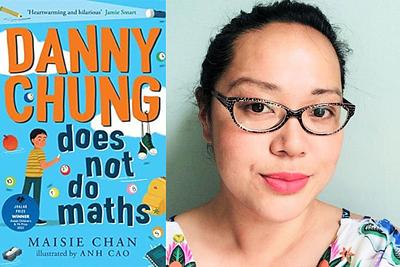Looking for all Articles by Maisie Chan?
Why representation of diverse ethnicities is important on your bookshelves

In both of my novels, I try to tackle othering, microaggressions and racism. In Danny Chung Does Not Do Maths, Danny is seen as 'different' by some of the boys in his class because of his race. Carter and his mum think that all Chinese people are good at maths. Danny really dislikes maths and loves to draw. He can't understand why Carter would think that about him. But stereotypes in society are powerful and people can reduce other people down to simple ideas which might not be true at all just because of the colour of their skin, their religion or culture.
It was important for me to centre a British Chinese boy who has been born in Britain but has a home life that includes Chinese culture. Danny is living between these two identities. And as a diasporic person, I understand how he feels. I felt that I was very British growing up, but people would see my skin colour and tell me to 'Go back to China!'– I've never been to mainland China. I was recently on a writing regional writing retreat, and I was asked 'What country are you from?' I found the question impertinent because the person asking only wanted to know what ethnicity I was. I wasn't seen as a whole person. No questions were asked about what I was writing (which everyone else who had talked to me asked) and I felt like I was being observed like a specimen. This person wanted to know why I looked like I didn't belong, I looked 'other' to her. After she had her answer, the conversation ended. That is othering. I was not considered British nor Scottish by the person asking that question, I was simply someone who looked like she didn't belong, a foreigner.
Nai Nai, Danny's gran is also seen as 'foreign' and 'other' – she's treated like she doesn't belong in the bingo hall by some of the regular players. We've all felt like an outsider in our lives, whether that is feeling excluded from friendship groups, or not getting a job for a certain reason, or feeling like your family members don't quite get you. My books try to show inclusiveness, that all types of people are part of the human race, and their stories are important too. I want to show that my characters have the same emotions and face life’s trials and tribulations the same as everyone else.
In Keep Dancing, Lizzie Chu, Lizzie and her wai gong (grandad) live in Glasgow, and so do Lizzie's friends: Chi Pham and her family are Welsh-Vietnamese, Tyler is Black and has two dads, one of which is an academic at Glasgow University. Why was it important for me to add those familial details? Because we see a lot of negative stereotypes about Black people and gay parents. Tyler is well-adjusted, kind and talented. I've also never seen a mixed British and Vietnamese family in children's literature, so I decided to create one.
There are a lot of dehumanising narratives out there about refugees, working class people, LGBTQ+ groups, Black people, Asian people and so forth. One of the negative things that can happen is that children internalise those negative stereotypes and think they are true about themselves. For children who look like me, or other black and brown children in Scotland, this is sadly an all too common occurrence. So having books that are diverse, that include multidimensional characters that are not tokenistic is important and can make a lasting impact.
Further resources
If you're interested in learning more about ethnic representation in children's fiction and its impact on young readers, see CLPE's annual 'Reflecting Realities' report(this link will open in a new window).
For learning resources, see our Understanding and challenging racism resource or our Read Woke resources, including a resource on using Maisie Chan’s Danny Chung Does Not Do Maths with your class.
For book recommendations, see our book lists – including books to help children challenge racism and stereotyping, as well as our favourite BPOC protagonist's in children's books.